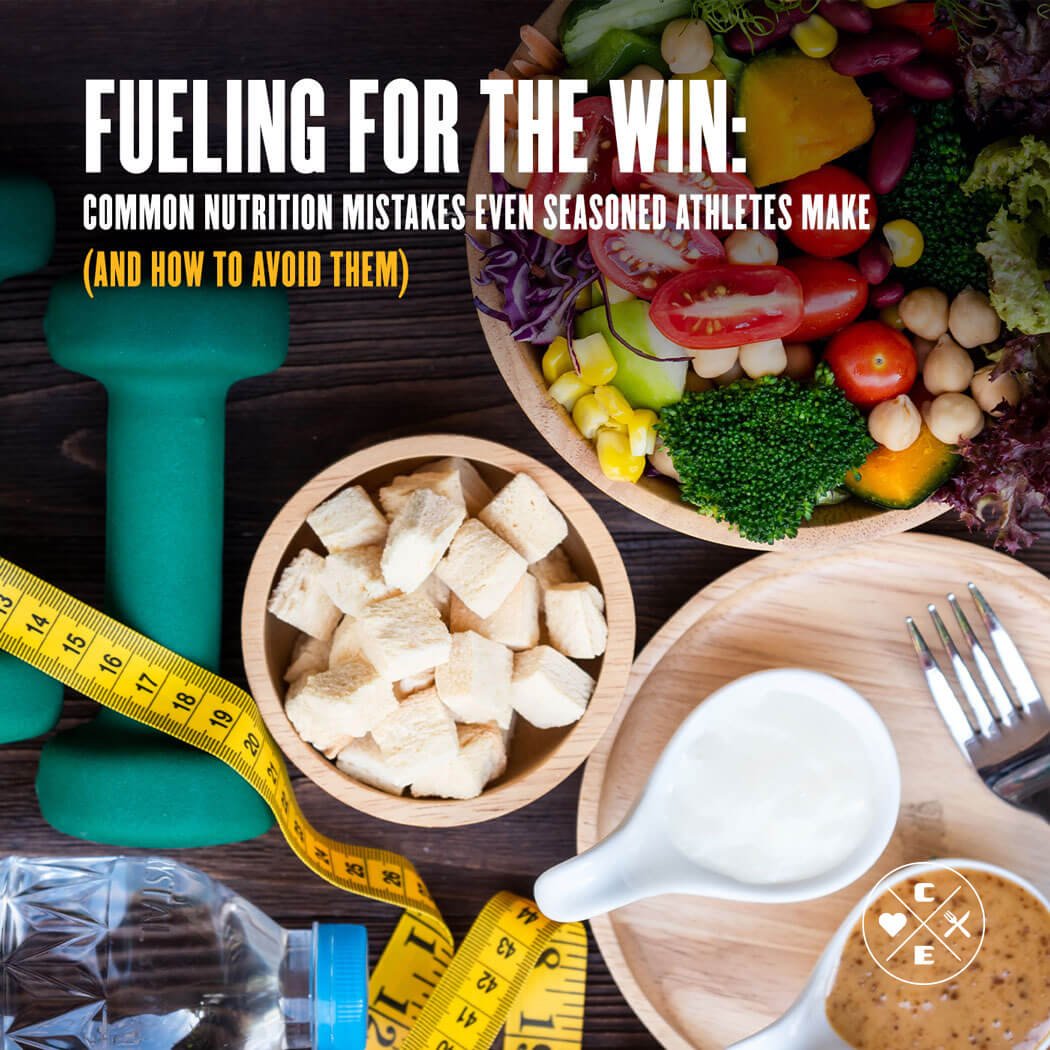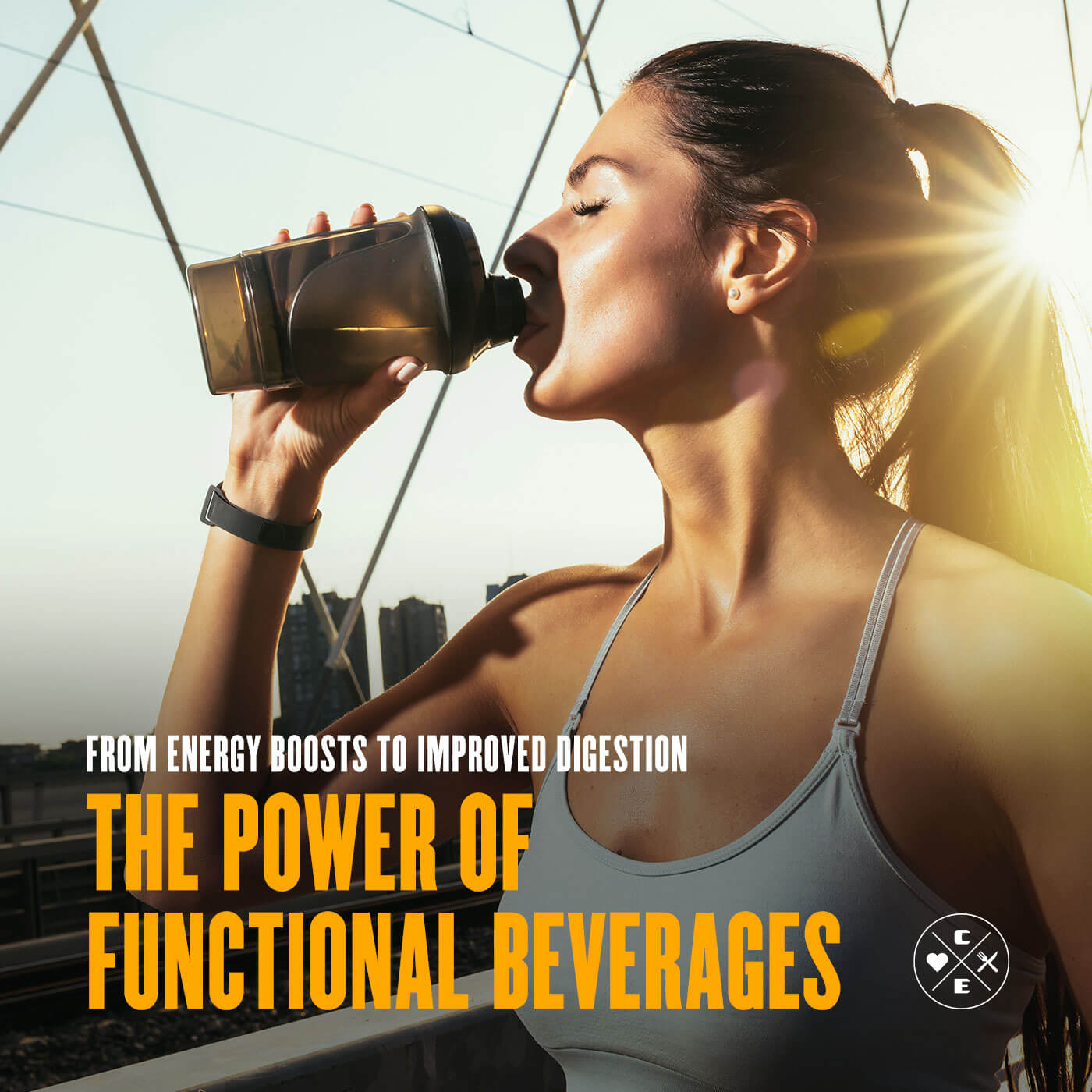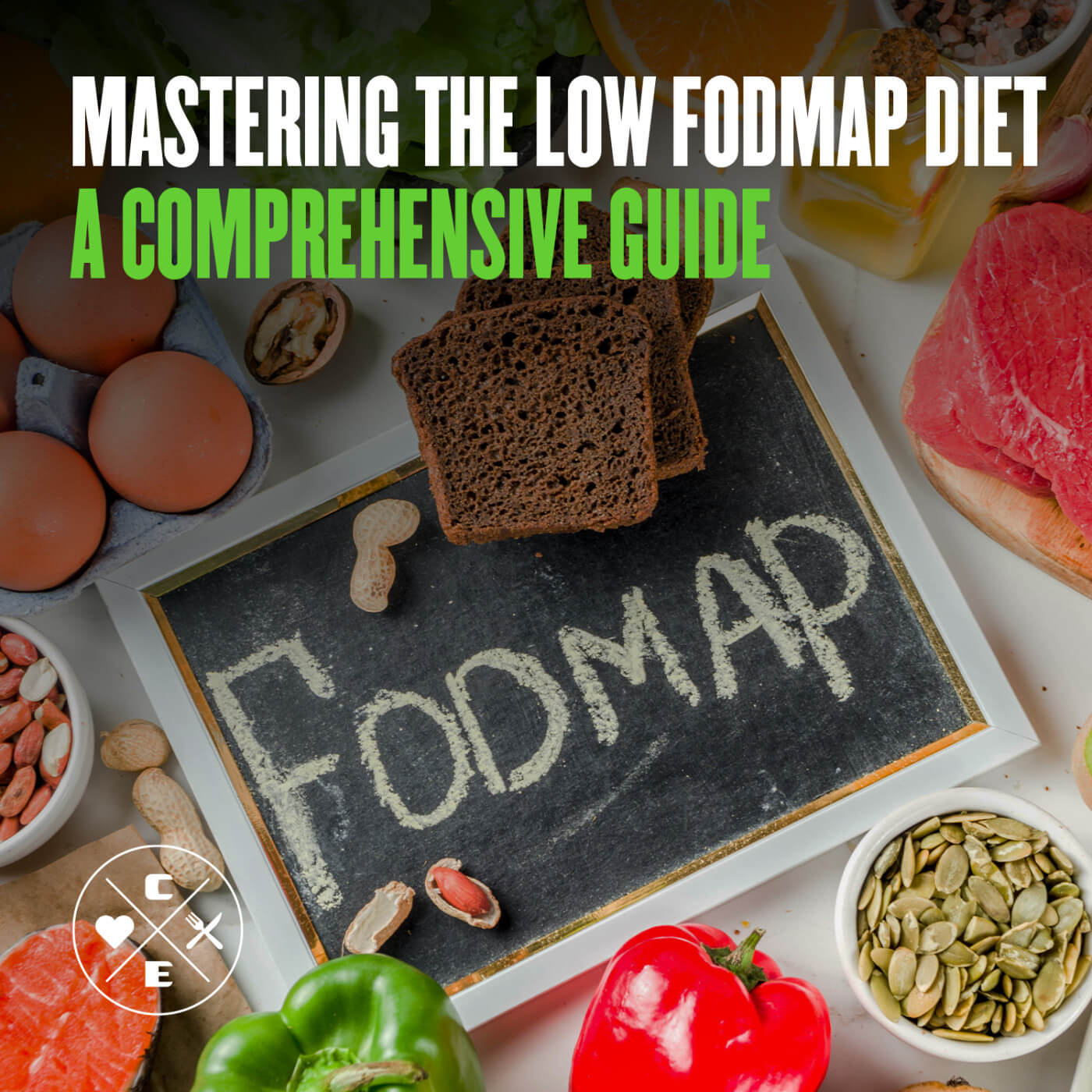
Fueling for the Win: Common Nutrition Mistakes Even Seasoned Athletes Make (and How to Avoid Them)
Dorothy M. Shirnyl, RND
Nutrition
|
Healthy Recipes
|
Healthy Lifestyle
18 minute read
Athletes push their bodies to the limit, demanding peak performance day in and day out. Yet, even the most disciplined and experienced competitors face a persistent challenge: optimizing their nutrition.
Proper nutrition is the cornerstone of athletic success. Just as a high-performance car requires premium fuel, athletes need the right nutrients to power their training, maximize their performance, and recover effectively.
While rigorous training regimens and well-honed techniques are crucial, the fuel athletes put into their bodies plays an equally pivotal role in their success. Surprisingly, even seasoned athletes can fall prey to common dietary missteps, hindering their performance, recovery, and overall well-being.
Proper nutrition is the cornerstone of athletic success. Just as a high-performance car requires premium fuel, athletes need the right nutrients to power their training, maximize their performance, and recover effectively.
Read on to discover the common nutrition pitfalls that even seasoned athletes encounter and learn how to fuel your body for optimal performance and recovery.
Common Dietary Mistakes Made by Athletes
1. Insufficient Caloric Intake
A common pitfall for athletes, particularly those focused on weight management or body composition, is underfueling. While it might seem logical to restrict calories to achieve a lean physique, this strategy can backfire dramatically. When athletes don't consume enough energy to meet the demands of their training, several negative consequences can arise such as:
- Decreased Performance. Calories are the body's primary source of energy. Without adequate fuel, athletes may experience fatigue, muscle weakness, and reduced endurance, ultimately hindering their ability to perform at their best.
- Slower Recovery. After intense workouts, the body needs energy to repair muscle tissue and replenish glycogen stores (the stored form of carbohydrates). Insufficient caloric intake can impede this recovery process, which can potentially lead to prolonged muscle soreness and an increased risk of overtraining.
- Increased Risk of Injury. When the body is in an energy deficit, it may start to break down muscle tissue for fuel. As a result, it leads to muscle loss and weakness. This can compromise joint stability and increase the risk of injuries like stress fractures.
- Hormonal Imbalances. Underfueling can disrupt the delicate balance of hormones like testosterone, estrogen, and cortisol. These imbalances can lead to a host of problems, including menstrual irregularities in women, decreased bone density, and impaired immune function.
- Slow Metabolism: Chronic underfueling can cause the body to adapt by slowing down its metabolism to conserve energy. This can make it harder to lose weight or maintain a healthy body composition in the long run.
How To Estimate Caloric Needs?
While various online tools can provide a rough estimate of your daily calorie needs, the Harris-Benedict equation offers a more tailored approach. This formula considers individual factors such as age, sex, height, and weight to calculate your Basal Metabolic Rate (BMR), representing the minimum calories your body burns at rest.
- For men, the formula is:
- 66 + (13.7 x weight in kg) + (5 x height in cm) - (6.8 x age in years)
- 66 + (13.7 x weight in kg) + (5 x height in cm) - (6.8 x age in years)
- For women, it's
- 655 + (9.6 x weight in kg) + (1.8 x height in cm) - (4.7 x age in years)
Remember: 1 inch equals 2.54 centimeters and 1 kilogram equals 2.2 pounds for unit conversions.
Once you've calculated your Basal Metabolic Rate (BMR) using the formula, you can then estimate your Total Daily Energy Expenditure (TDEE) by multiplying your BMR by an activity multiplier based on your level of physical activity:
- Sedentary: BMR x 1.2
- Lightly active: BMR x 1.375
- Moderately active: BMR x 1.55
- Very active: BMR x 1.725
- Extra active: BMR x 1.9
For example, a moderately active 30-year-old woman who is 5'6" (167.6 cm) tall and weighs 120 pounds (54.5 kg) would have a BMR of about 1339 calories per day. Multiplying this by 1.55 (the activity factor for moderate activity) yields a TDEE of roughly 2075 calories. This is the estimated number of calories she needs to maintain her current weight.
It's important to note that the Harris-Benedict formula is just an estimation, and individual calorie needs can vary.
2. Neglecting Hydration
Water is a crucial, yet often underestimated, element of athletic success. While macronutrients like carbohydrates and protein often take the spotlight, proper hydration is fundamental for maintaining peak physical and mental function. Even minor dehydration can significantly impact an athlete's abilities, triggering a series of negative effects like:
- Decreased Endurance. Water plays a vital role in transporting nutrients and oxygen to working muscles, as well as removing waste products like lactic acid. When dehydrated, blood volume decreases, making it harder for the heart to pump blood efficiently. This results in reduced endurance and a quicker onset of fatigue.
- Increased Fatigue. Dehydration can lead to a buildup of metabolic byproducts, contributing to muscle fatigue and a feeling of overall tiredness. Even a 2% loss of body weight due to dehydration can significantly impair athletic performance.
- Impaired Thermoregulation. Water is essential for regulating body temperature. When dehydrated, the body struggles to cool itself down through sweating, increasing the risk of heat exhaustion and heatstroke. This is especially dangerous in hot or humid environments.
- Cognitive Decline. The brain is highly sensitive to dehydration. Even mild dehydration can impair cognitive function, affecting reaction time, decision-making, and overall mental clarity.
- Increased Risk of Cramping and Muscle Injury. Electrolyte imbalances, which can occur with dehydration, are a common trigger for muscle cramps. Dehydration can also increase the risk of muscle strains and tears due to decreased muscle flexibility and impaired neuromuscular function.
How To Stay Hydrated: Before, During, and After Trainings Or Competitions
Maintaining optimal hydration isn't just about drinking water when you're thirsty. It requires a strategic approach that addresses your fluid needs before, during, and after physical activity. Here's a suggested breakdown of effective hydration strategies for athletes:
- Before: Aim to drink 17-20 ounces (approximately 500-600 ml) of water at least 2 hours prior to exercise.
- During: Consume 7-10 ounces (approximately 200-300 ml) of water every 10-20 minutes during exercise.
- After: Drink 16-24 ounces (approximately 470-710 ml) of water for each pound (0.45 kg) of body weight lost due to sweating. Weighing yourself before and after exercise can help determine your fluid losses.
While these are general guidelines, it's crucial to remember that individual hydration needs can vary significantly. Factors such as body weight, sweat rate, exercise intensity, duration, and environmental conditions all play a role in determining how much water you need.
Listen to your body's signals and adjust your fluid intake accordingly. If you experience thirst, fatigue, dizziness, or muscle cramps, these could be signs of dehydration, and you may need to drink more water.
Additionally, consider incorporating electrolyte-rich beverages or snacks, especially for prolonged or intense exercise, to replenish lost minerals like sodium, potassium, and magnesium. These electrolytes are essential for proper hydration and muscle function.
3. Imbalanced Macronutrient Distribution
Macronutrients—carbohydrates, protein, and fats—are the fundamental building blocks of your body's energy production. Each macronutrient serves a distinct purpose, contributing to energy levels, muscle development, and overall physiological function. For athletes, achieving peak performance hinges on striking the right balance between these three fuel sources.
Carbohydrates
Carbohydrates are the body's preferred fuel during exercise. It provides the energy needed for sustained performance.
Insufficient carbohydrate intake can lead to depleted glycogen stores (the stored form of carbohydrates in muscles and the liver), resulting in fatigue, diminished endurance, and compromised athletic output.
Conversely, excessive carbohydrate consumption without adequate exercise can contribute to unwanted weight gain and other health concerns.
Protein
Protein is essential for muscle repair and growth, which is a crucial nutrient for athletes seeking to enhance their strength and performance. Inadequate protein intake can impede muscle recovery, elevate the risk of injury, and potentially lead to muscle loss.
However, it's important to note that consuming excessive protein won't necessarily accelerate muscle growth and may displace other essential nutrients in the diet.
Fats
Fats provide a concentrated source of energy and play a pivotal role in hormone production, nutrient absorption, and maintaining the integrity of cell membranes. While some dietary fat is necessary for overall health, consuming too much can lead to weight gain and other health issues.
Conversely, inadequate fat intake can lead to deficiencies in essential fatty acids and fat-soluble vitamins, both of which are critical for athletic performance.
Common Macronutrient Imbalances
- High Protein, Low Carb. A common mistake among athletes is overemphasizing protein intake at the expense of carbohydrates. While protein is essential for muscle recovery, carbs are the primary fuel source during exercise. Skimping on carbs can lead to fatigue, poor performance, and difficulty sustaining workouts.
- Low Fat. Some athletes may restrict fat intake in an attempt to reduce calories or manage weight. However, healthy fats are essential for hormone balance, vitamin absorption, and overall health. A diet too low in fat can negatively impact energy levels, mood, and recovery.
- High Carb, Low Protein. While endurance athletes need ample carbs, neglecting protein can hinder muscle repair and recovery. A diet overly reliant on carbohydrates and lacking in protein can lead to muscle loss and increased susceptibility to injuries.
The ideal macronutrient ratio for athletes varies depending on the specific sport, training intensity, and individual goals.
Endurance athletes typically require a higher percentage of carbohydrates for sustained energy, while strength-focused athletes may benefit from a slightly higher protein intake to support muscle repair and growth.
However, all athletes need a well-rounded balance of all three macronutrients to optimize their performance and overall health.
General Guidelines for Macronutrient Distribution
While individual needs may vary, a general starting point for athletes is:
- Carbohydrates: 45-65% of total daily calories
- Protein: 10-35% of total daily calories
- Fats: 20-35% of total daily calories
These are just broad recommendations, and fine-tuning your macronutrient intake is best done with the guidance of a registered dietitian or sports nutritionist. They can help you determine the optimal balance for your specific sport, training regimen, and personal goals. This ensures that you're fueling your body effectively for peak performance.
4. Over-reliance on Supplements
Supplements can be a convenient way to fill nutritional gaps or address specific needs, but they should not be viewed as a replacement for a balanced, whole-foods diet. Over-reliance on supplements can lead to several drawbacks. This include:
- Missing Out on Essential Nutrients. While supplements can provide isolated nutrients, they often lack the complex array of vitamins, minerals, fiber, and phytonutrients found in whole foods. These additional compounds play vital roles in overall health, immune function, and disease prevention.
- Risk of Nutrient Imbalances. Focusing on supplements can lead to neglecting other essential nutrients found in whole foods. For example, excessive protein intake through supplements can displace carbohydrates and fats, leading to imbalances that can negatively impact energy levels and overall health.
- Potential for Contamination and Adverse Effects. The supplement industry is not as strictly regulated as the food industry, and some products may contain harmful contaminants or ingredients not listed on the label. Additionally, some supplements can interact with medications or have adverse effects in certain individuals.
- Cost and Sustainability: Supplements can be expensive, and relying on them as a primary source of nutrients can be financially unsustainable in the long run. Whole foods, on the other hand, can often provide better value for money and are a more sustainable option for meeting nutritional needs.
Prioritize Whole Foods for Optimal Nutrition!
Yes, it is true that supplements can be a convenient way to fill nutritional gaps or address specific needs. However, they should not be viewed as a replacement for a balanced, whole-foods diet.
A food-first approach emphasizes the importance of obtaining essential nutrients from natural sources like fruits, vegetables, whole grains, lean proteins, and healthy fats. These foods offer a wide range of vitamins, minerals, fiber, and phytonutrients that work synergistically to support overall health and athletic performance.
Furthermore, whole foods also provide essential nutrients in their most bioavailable forms, meaning they are more easily absorbed and utilized by the body. They contain fiber, which aids in digestion, promotes satiety, and helps maintain stable blood sugar levels – all crucial factors for athletes.
While a food-first approach is ideal, there are instances where supplements may play a role in an athlete's diet:
- Specific Deficiencies. Athletes with diagnosed deficiencies in certain nutrients, like iron or vitamin D, may need supplements to address these shortfalls.
- Dietary Restrictions or Allergies. Those with dietary restrictions, such as vegans or vegetarians, may require supplements like vitamin B12 or omega-3 fatty acids, which are primarily found in animal products.
- Performance Enhancement. Some supplements, like creatine or beta-alanine, have been shown to enhance performance in specific types of exercise when used appropriately.
However, it's important to emphasize that supplements should complement, not replace, a healthy diet! Before turning to supplements, athletes should prioritize optimizing their intake of nutrient-dense whole foods.
5. Skipping Meals or Inconsistent Eating Patterns
Maintaining consistent energy levels is crucial for athletes. Skipping meals or following irregular eating patterns can disrupt the body's natural rhythm and lead to a roller coaster of energy highs and lows. This inconsistency can significantly impact athletic performance.
When meals are skipped or spaced too far apart, blood sugar levels can drop. This drop in blood sugar triggers the release of stress hormones like cortisol, which can further exacerbate fatigue and impair cognitive function. These energy dips can hinder athletic performance, making it difficult to train effectively or compete at your best. Additionally, irregular eating patterns can disrupt the body's internal clock, affecting sleep patterns, hormone production, and overall metabolism.
The Benefits of Consistent Eating
Eating regular meals and snacks throughout the day helps maintain stable blood sugar levels, providing a steady supply of energy for training and competition. It also supports optimal muscle function and recovery, reduces the risk of overeating later in the day, and helps maintain a healthy body composition.
The timing of meals and snacks can also play a role in optimizing athletic performance. Eating a balanced meal or snack containing carbohydrates and protein within 1-2 hours after exercise can replenish glycogen stores and promote muscle repair, aiding in recovery. It's also important to fuel your body adequately before workouts to ensure you have enough energy to sustain your efforts.
Practical Meal Planning and Timing Strategies
To establish consistent eating patterns and ensure steady energy levels, consider these practical strategies:
- Eat Every 3-4 Hours. Aim to eat a meal or snack every 3-4 hours throughout the day. This will help maintain stable blood sugar levels and prevent energy dips.
- Prioritize Protein and Complex Carbs. Include a source of protein and complex carbohydrates at each meal and snack. Protein helps with muscle repair and satiety, while complex carbs provide sustained energy. Examples include:
- Breakfast: Greek yogurt with berries and granola, or oatmeal with nuts and seeds.
- Lunch: Salad with grilled chicken or fish, or a turkey sandwich on whole-wheat bread.
- Dinner: Lean protein like chicken, fish, or tofu with vegetables and brown rice or quinoa.
- Snacks: Fruit with nut butter, hard-boiled eggs, or a protein shake.
- Plan Ahead. Prepare meals and snacks in advance to ensure you have healthy options readily available. Consider using a meal prep service or dedicating a few hours each week to batch cooking.
- Fuel Your Workouts. Eat a balanced meal or snack containing carbohydrates and protein about 1-2 hours before exercise to fuel your muscles and support performance.
- Refuel After Exercise. Replenish glycogen stores and promote muscle recovery by eating a carbohydrate and protein-rich snack or meal within 30 minutes to 1 hour after exercise.
- Don't Skip Meals. Even if you're not feeling hungry, try to eat something small to maintain steady energy levels.=
6. Ignoring Recovery Nutrition
Recovery nutrition is often overlooked by athletes, yet it's a critical component for maximizing performance gains and preventing overtraining. The period immediately following exercise is a prime opportunity for the body to replenish depleted energy stores, repair muscle damage, and rebuild stronger.
Failing to provide adequate nutrition during this window can hinder recovery, prolong muscle soreness, and increase the risk of injury.
The Window of Recovery
The 30-60 minutes after exercise is often referred to as the "golden window" of recovery. During this time, the body is primed to absorb nutrients and utilize them for repair and rebuilding. Consuming a combination of carbohydrates and protein during this window is key for replenishing glycogen stores (the stored form of carbohydrates in muscles) and stimulating muscle protein synthesis (the process of building new muscle tissue).
The Benefits of Post-Workout Nutrition
- Improved Muscle Recovery. Consuming protein after exercise provides the building blocks for muscle repair and growth, helping to reduce muscle soreness and improve recovery time.
- Enhanced Glycogen Replenishment. Consuming carbohydrates after exercise helps replenish depleted glycogen stores. This ensures adequate energy for subsequent workouts and competitions.
- Increased Muscle Protein Synthesis. Combining carbohydrates and protein post-workout maximizes muscle protein synthesis. It leads to greater muscle growth and adaptation.
- Reduced Risk of Injury. Proper recovery nutrition helps repair damaged tissues and reduce inflammation, decreasing the risk of overuse injuries.
- Improved Immune Function. Nutrient deficiencies can compromise the immune system, making athletes more susceptible to illness. Post-workout nutrition helps replenish essential nutrients and support immune function.
The Optimal Post-Workout Nutrition
The ideal post-workout meal or snack should contain a combination of carbohydrates and protein in a ratio of approximately 3:1 or 4:1. This means for every 3-4 grams of carbohydrates, consume 1 gram of protein. Examples of suitable post-workout snacks or meals include:
- Greek yogurt with berries and granola
- Chocolate milk
- Protein shake with fruit
- Turkey sandwich on whole-wheat bread
- Chicken breast with sweet potato and vegetables
The timing of your post-workout meal is also important. Aim to consume it within 30 minutes to 1 hour after exercise for optimal results.
If you're unable to eat a full meal right away, a protein shake or a simple snack like fruit and nut butter can suffice.
How to Correct Common Dietary Mistakes Athletes Make?
Now that we've explored the common dietary pitfalls athletes encounter, let's dive more into practical strategies for optimizing your nutrition and fueling your athletic pursuits.
1. Prioritize Nutrient Density
Nutrient density refers to the amount of nutrients a food provides relative to its calorie content. Focusing on nutrient-dense foods ensures you get the most nutritional bang for your buck.
Choose whole foods like fruits, vegetables, whole grains, lean protein sources, and healthy fats over processed foods, which are often high in calories but low in nutrients. This approach can help you meet your nutrient needs without overconsuming calories.
2. Pay Attention to Food Quality
Choose Organic when possible.Organic produce may have lower pesticide residues and may be higher in certain nutrients.
Then, opt for grass-fed and free-range animal products. Why? Animal products from grass-fed and free-range sources tend to have a more favorable fatty acid profile and may contain higher levels of certain vitamins.
Lastly, limit processed foods as they often contain added sugars, unhealthy fats, and artificial ingredients that can hinder athletic performance and overall health.
3. Listen to Your Body:
Pay attention to your body's hunger and fullness signals and eat accordingly. Don't force yourself to eat if you're not hungry, and stop when you're comfortably full.
Notice how different foods affect your energy levels and adjust your diet accordingly. If certain foods leave you feeling sluggish or fatigued, limit them.
Additionally, Track how changes in your diet affect your athletic performance and recovery.
4. Consume Antioxidant-Rich Foods
Athletes generate more free radicals during exercise, leading to oxidative stress. Consuming antioxidant-rich foods like berries, leafy greens, and nuts can help combat this stress and promote recovery.
5. Consider the Timing of Nutrient Intake
Have a pre-workout snack. A small, easily digestible carbohydrate snack 30-60 minutes before exercise can provide quick energy and prevent blood sugar crashes during your workout.
For prolonged endurance activities lasting more than an hour, consider consuming carbohydrates during exercise to maintain energy levels and delay fatigue.
Note that the 30-60 minutes after exercise is crucial for recovery. Consume a combination of carbohydrates and protein during this time to replenish glycogen stores and initiate muscle repair.
6. Manage Stress
Chronic stress can negatively impact athletic performance and recovery. Implement stress-management techniques like meditation, yoga, or deep breathing exercises.
7. Prioritize sleep
Sleep is essential for muscle recovery, hormone regulation, and cognitive function. Aim for 7-9 hours of quality sleep per night.
Optimize Your Diet for Athletic Success!
Don't let common nutrition mistakes hold you back from achieving your peak potential. Instead, embrace the power of food to fuel your body, enhance your recovery, and propel you towards greatness.
Remember, every bite is an opportunity to optimize your performance and well-being. So, ditch the quick fixes and embrace a personalized nutrition plan that truly nourishes your body. Your journey to athletic excellence starts with the fuel you choose. Make every meal count.
At Clean Eatz Kitchen, we understand the challenges athletes face in maintaining a balanced and delicious diet. That's why we offer over 45 flavorful, nutritionally balanced meals, starting at just $8.99.
Our menu caters to diverse dietary needs, including keto and gluten-free options, ensuring every athlete can find meals that support their peak performance and recovery. Experience the convenience and satisfaction of healthy eating with Clean Eatz Kitche!



